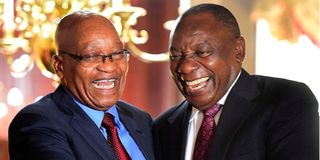SA President Cyril Ramaphosa hits back at predecessor Jacob Zuma over ‘private prosecution’

What you need to know:
- Former President Jacob Zuma's troubles continue as he battles with current President Cyril Ramaphosa over a series of allegations he made in the past
- He also is suffering from alleged health conditions which are proving to be another source of controversy and skepticism
South African President Cyril Ramaphosa has criticised his predecessor Jacob Zuma over his last-minute bid to force him to step down as a candidate during the recent ruling party African National Congress’ leadership race.
President Ramaphosa, who has termed Mr Zuma’s move as an “abuse of legal process,” has applied for an urgent interdict against the former president’s latest legal antics.
Mr Ramaphosa is challenging the allegations by Mr Zuma that he failed to act as president of the country against Billy Downer (the lead state prosecutor in Zuma’s 18-year-long corruption kickback saga) in the former South African leader’s private prosecution of Downer and a journalist whom he accuses of having ‘leaked’ and published his medical condition.
The South African President has applied to the Pretoria High Court to set aside summons served on him regarding Zuma’s private prosecution.
Prior to that order, Mr Ramaphosa asked the court to reject what Mr Zuma said, describing it as “a gross abuse of legal process”.
Effectively, in the citation which came on the eve of the ruling African National Congress (ANC) five-yearly elective conference, Zuma accused Ramaphosa of having failed to act on his allegations of ‘bias’ on the part of Downer, who 17 years ago successfully prosecuted Zuma’s former financial adviser on the same 783 counts of fraud, money-laundering and corruption which the former president is currently facing.
Medical condition
Zuma returns to court on January 30, 2023. He has failed to have Downer removed from the case. He had wanted Ramaphosa to appear in court on January 19, as one of the ‘accused’ in his private prosecution of Downer and journalist Karyn Maughan for allegedly ‘leaking’ his much-disputed medical condition. This was published in a report by Maughan.
Downer has denied leaking any information regarding Mr Zuma’s medical condition to Maughan.
Maughan, who has been closely following Zuma’s many legal tribulations and engagements, said she received the information from another prosecutor. She said the information was contained in one of the legal matters in which Zuma’s health was cited.
Zuma’s release after staying in prison for two months was controversial.
The courts have subsequently ruled, illegally, by his close ally and former administrative head of the prisons, Arthur Fraser, after just two months behind bars last year, ostensibly due to Zuma’s then-undisclosed medical ‘condition’.
Given that Zuma’s ‘condition’, protected under S Africa’s Constitution as highly privileged information, was perhaps ‘chronic’, but not nearly as serious as was being made out, the designated parole board had declined Zuma’s requested early medical release from a 15-month prison sentence for contempt, imposed by the Constitutional Court.
The former administrative head of the prisons, Arthur Fraser, who was also the person behind the criminal complaints made against Ramaphosa in early June this year, related to the theft of US$580,000 from the president’s Phala Phala game farm in February 2020, overruled the parole board and freed Zuma anyway.
Prosecution
Having failed before serial courts up to the apex Constitutional Court to have Downer removed from his own prosecution, Zuma applied for the right to conduct a private prosecution against Downer and Maughan, allegedly for violating his medical information privacy rights, as Constitutionally-protected.
The state having declined to prosecute, Zuma was granted that private prosecution right, although the great majority of legal analysts believe the effort is doomed, and most have described it as merely another element in Zuma’s long-running ‘Stalingrad defence’ strategy of using legal processes to delay his own day in the dock.
In what was evidently a plan to sideline Ramaphosa and prevent his second term as the ruling party and national leader, Zuma’s day-before-conference ‘inclusion’ of Ramaphosa in that private prosecution was meant to render the president ineligible for election in the recent ANC conference.
Backed by most of the ANC party leadership and structures Ramaphosa emerged victorious.
However, Zuma has remained defiant, insisting that the summons received by Ramaphosa are legal and that he must appear as a co-accused along with Downer and Maughan in the Johannesburg High Court on the stated date.
Ramaphosa, in turn, has lambasted Zuma in a six-page letter sent to the former president for his bid to “abuse the processes of the law” by dragging him into his graft case.
If he had acted against Downer, Ramaphosa pointed out, he would have violated his oath of office by interfering in a process wherein he had no authority.
Ironically, such unconstitutional ‘interference’ was one of the major pieces of misconduct laid before Zuma’s feet by Chief Justice Raymond Zondo, in the latter’s report on his four-year graft probe when Zuma was president.
Corruption trial
Besides effectively challenging the legality of Zuma’s effort to manufacture yet another delay in his corruption trial by attacking his prosecutor’s right to act for the state, Ramaphosa wants the High Court to rule on January 10 that the charge against him is invalid in law.
Ramaphosa wants Zuma to be interdicted from taking any more steps in his private prosecution and that Zuma, who already has huge legal bills to pay, cover his costs in defending himself from this latest legal assault.
Legal analysts have said that the case against Downer and Maughan was “an extreme stretch”, allowed under South African law but with no chance of success based on known facts.
The latest foray by Zuma into dubious legalisms has increased the financial pressure on him through his many legal engagements using expensive lawyers.
The State Attorney’s office has confirmed it will sue the former president for the $1 million, “plus interest”, Zuma owes in state-funded defence costs.
There are also cost awards against him to be paid and the ongoing cost of his legal team in his corruption trial, which is set to run over several months through 2023.
Also recently, Zuma was told that his Nkandla homestead, state-paid upgrades which contributed to his downfall, would be seized for failure to repay a $450,000 loan.
The loan was taken to cover the tax on the refurbishment of the estate near Zuma’s birthplace in the Zulu homeland of KwaZulu-Natal.




